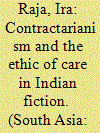| Srl | Item |
| 1 |
ID:
120706


|
|
|
|
|
| Publication |
2013.
|
| Summary/Abstract |
Through close readings of recent fiction from English, Hindi and Kannada sources, this paper analyses the feminist ethic of care with reference to adult daughters caring for their critically-ill or dying mothers. The discussion focuses on problems associated with the care ethic and examines some of its assumptions, particularly its inability to account for the emotional complexity of adult caregiving relationships, which can make the invocation of relationality difficult; its focus on responsiveness to needs, such as those of helpless infants, which prevents adequate engagement with ideas of reciprocity; and, finally, its extraction of the caregiving relationship from the network of social and familial relationships in which it is embedded. Alongside my critique of the ethic of care, I will also examine the extent to which mainstream moral concepts, such as rights and contracts, may continue to be relevant to the dynamics of intergenerational relations in old age.
|
|
|
|
|
|
|
|
|
|
|
|
|
|
|
|
| 2 |
ID:
145747


|
|
|
|
|
| Summary/Abstract |
Drawing from ethnographic data from 48 households in four villages in rural Anhui, this study explores how two practices known for upholding son preference are affected by rural–urban out-migration, with a particular focus on the division of labour in agricultural work and patrilocality. The study deploys the concepts of an intergenerational contract and the “unsubstitutability” of sons and finds that a weakening of the intergenerational contract can take place without substantially challenging the unsubstitutability of sons. The study concludes that although male out-migration undermines the argument that sons are needed to secure male manual labour in family farming, the vital role of male labour as a rural livelihood strategy largely persists. Moreover, although the study identifies migration-induced exceptions, patrilocality remains the main organizing principle for social and economic life for both male and female migrants. Hence, the study finds little support for the prospect that migration is attenuating son preference in rural China.
|
|
|
|
|
|
|
|
|
|
|
|
|
|
|
|